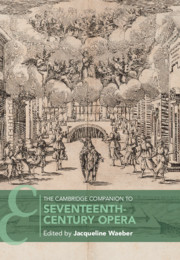Book contents
- The Cambridge Companion to Seventeenth-Century Opera
- Cambridge Companions to Music
- The Cambridge Companion to Seventeenth-Century Opera
- Copyright page
- Contents
- Music Examples
- Figures
- Tables
- Contributors
- Preface
- Chronology
- Abbreviations
- Part I The Italian Foundations
- Part II Society, Institutions, and Production
- 5 Opera for a Paying Public (Italy c. 1637–c. 1700)
- 6 ‘Una bella voce, un bel trillo, ed un bel passaggio’
- 7 Opera, Gender, and Voice
- 8 Dance and Ballet
- 9 Staging Opera in the Seventeenth Century
- Part III National Traditions (outside Italy)
- Further Reading
- Index
7 - Opera, Gender, and Voice
from Part II - Society, Institutions, and Production
Published online by Cambridge University Press: 08 December 2022
- The Cambridge Companion to Seventeenth-Century Opera
- Cambridge Companions to Music
- The Cambridge Companion to Seventeenth-Century Opera
- Copyright page
- Contents
- Music Examples
- Figures
- Tables
- Contributors
- Preface
- Chronology
- Abbreviations
- Part I The Italian Foundations
- Part II Society, Institutions, and Production
- 5 Opera for a Paying Public (Italy c. 1637–c. 1700)
- 6 ‘Una bella voce, un bel trillo, ed un bel passaggio’
- 7 Opera, Gender, and Voice
- 8 Dance and Ballet
- 9 Staging Opera in the Seventeenth Century
- Part III National Traditions (outside Italy)
- Further Reading
- Index
Summary
The invention of opera not only introduced musical, dramatic, and aesthetic innovations, but it also prompted unexpected changes in gender roles and social relationships, in particular the appearance of the first women to sing on the operatic stage as professionals and the rise of the castrato. The stricter gender roles of early modern society meant that a professional female singer appearing in public was perceived to be committing a significant transgression. The public sphere was primarily a male space where men could act professionally and still maintain their honour and prestige, whereas the reputation of a woman who performed on stage was considerably more precarious: her career was likely to be viewed as indistinguishable from prostitution. The embodiment of an object of desire, the female singer was viewed as both threatening and appealing. Crossing the border between public and private spheres was therefore a bold move for a woman and exposed those who did it to all kinds of attacks. In everyday life, chastity, moderation, silence, and invisibility were the major virtues associated with an honest woman. Female opera singers became visible and professionally active by exhibiting themselves onstage; they also transgressed the border between silence and voice.1
- Type
- Chapter
- Information
- The Cambridge Companion to Seventeenth-Century Opera , pp. 146 - 169Publisher: Cambridge University PressPrint publication year: 2022



